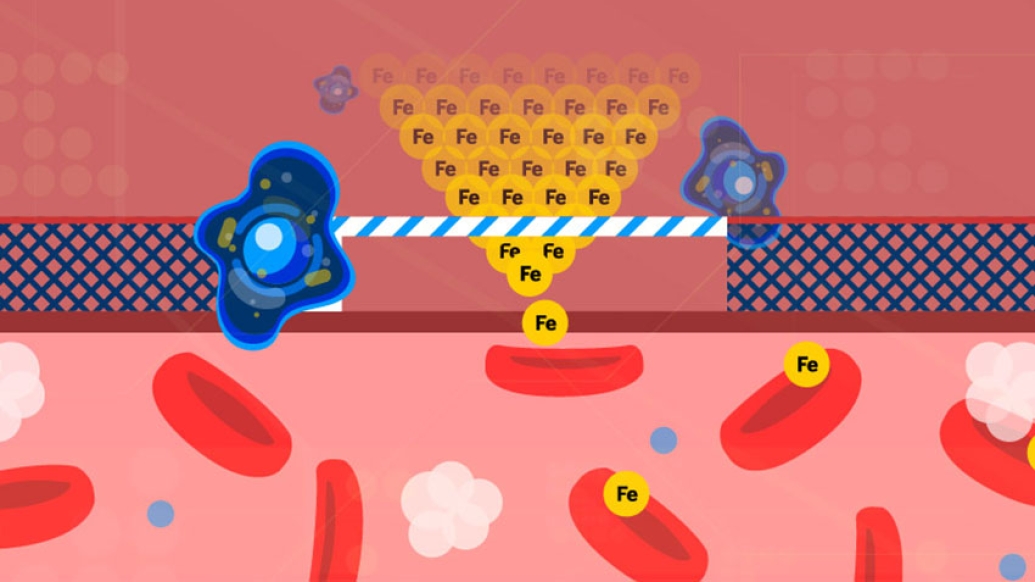The body’s resident bacteria play a major role in divvying out iron—a fact that could be used to treat iron-related disorders.
11:15 AM
Author |

While most people in developed nations may not think much about dietary iron, almost a quarter of the global population lacks this essential nutrient.
Iron plays a critical role in providing oxygen to the body's cells. Too little iron can lead to iron deficiency anemia and symptoms such as fatigue, heart palpitations and shortness of breath. Too much can lead to iron overload and a disease called hemochromatosis, which can cause heart failure.
Michigan Medicine researchers have unlocked a mechanism behind how the body decides whether or not to absorb iron from the food--one that involves the trillions of bacteria in our guts known as the gut microbiome.
"If you have a low-iron diet, the body absorbs more of it in an adaptive mechanism to get enough," says Nupur Das, Ph.D., a research investigator in the Department of Molecular and Integrative Physiology. "Our gut microbiomes are also dependent on iron. Different microbes have different iron needs to survive."
He along with Yatrik Shah, Ph.D., a professor in the Department of Internal Medicine and Molecular and Integrative Physiology, and their research team have shown that the bacteria in the gut actively compete with the human body for iron from the diet. They describe their work in a new paper in Cell Metabolism.
MORE FROM THE LAB: Subscribe to our weekly newsletter
Using mice, they found that certain bacteria in the gut produce metabolites that inhibit the transcription factor HIF-2 in the intestine. By doing so, the gut bacteria block iron absorption by the body.
"During a pilot experiment, we found that germ-free mice [mice specially bred to have no bacteria anywhere in their systems] were resistant to anemia," says Shah, senior author on the paper. "The easiest explanation is that you've gotten rid of a trillion bacteria and they no longer need iron. But interestingly, we saw that the iron absorptive mechanisms were all highly upregulated in the absence of microbiota."
In other words, without the gut bacteria there to dial back iron absorption, the body's systems for taking iron in were turned all the way up. To confirm this observation, the group administered antibiotics to normal mice. They found that mice treated with antibiotics also saw an increase in iron absorption. Further, germ-free mice that had gut bacteria transplanted into their systems had reduced iron levels.
What these intriguing findings suggest is an unconventional treatment for iron-related disorders. "In an anemic patient, you could help by getting rid of the gut microbiota. Conversely, reintroducing the microbial metabolites that inhibited the absorptive system would reduce iron absorption in patients that have iron overload disorders," says Shah.
Das and Shah note that the antibiotics are inexpensive, readily available and could hold promise for the more than 1.5 billion people globally with iron-deficiency anemia. "In the anemic scenario, some places of the world can't afford food with enough iron. These findings suggest we can still improve anemia even when faced with a low iron diet," says Das.
LISTEN UP: Add the new Michigan Medicine News Break to your Alexa-enabled device, or subscribe to our daily updates on iTunes, Google Play and Stitcher.
Furthermore, they note that there are gut specific antibiotics, reducing the risk of antibiotic resistance and can be administered to lower but not completely eliminate beneficial gut microbiota.
Says Shah, "We feel that decreasing the microbial burden for a short time would outweigh some of the consequences as anemia, especially in developing nations, can be quite crippling for individuals."
Paper Cited: Yatrik M. Shah et al. "Microbial metabolite signaling is required for systemic iron homeostasis", Cell Metabolism. DOI: 10.1016/j.cmet.2019.10.005

Explore a variety of health care news & stories by visiting the Health Lab home page for more articles.

Department of Communication at Michigan Medicine
Want top health & research news weekly? Sign up for Health Lab’s newsletters today!





